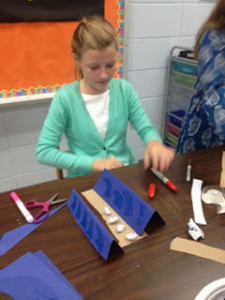Rebecca S. Ramsey's Blog, page 6
September 20, 2021
The Ark and the Tent
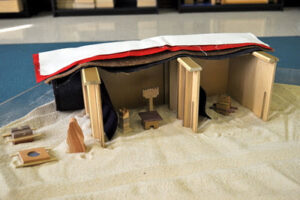 Welcome to the Ark and the Tent, the Godly Play story scheduled for this Sunday, October 13, based on Exodus 25-31, 35-40. You can find the script on p.81-86 in the orange book (The Complete Guide to Godly Play, Vol 2, 14 Presentations for Fall, by Jerome W. Berryman).
Welcome to the Ark and the Tent, the Godly Play story scheduled for this Sunday, October 13, based on Exodus 25-31, 35-40. You can find the script on p.81-86 in the orange book (The Complete Guide to Godly Play, Vol 2, 14 Presentations for Fall, by Jerome W. Berryman).
There are different approaches to this lesson that teachers can take. Of course we can all go through a study of each of the steps of getting ready and the tools mentioned above to help them get ready. Many churches still use several of these today. Are there any that we use? Are there new ones not included with the tent?
We can also think about how we get ready to do different things in our lives–to go places that are important to us, for example. How do we get ready to hear our Godly Play stories? Why is that important? How do we get ready to be with God? What do we do? How exactly do the routines we do help us get ready? Can we practice getting ready to be with God when we’re at home too? How would we do that?
One thing that the Godly Play script doesn’t highlight which you may want to include is the idea that all the people of God were invited to give something of their own to creating the tent of meeting–not just jewelry or fabric or wood, but their own craftsmanship. It was created by the people of God, for God.
Ideas for Art Response TimeThis story is practically BURSTING with ideas for little hands–and big ones too!
I can easily see the activity time for this story beginning this Sunday, but continuing at least one other Sunday. Soon we’ll do the Ark and the Temple, so the work could easily continue with that story too.
Here are some that I came up with to add to your own. (And please, do feel free to write a comment to share your own ideas!)
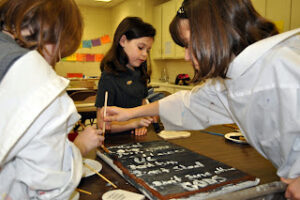
Children might like to make their own collection of getting ready pieces like a menorah, an incense holder, a laver, an ark. They could make tiny pieces with clay or boxes or pieces of wood or whatever materials we have.
Or they could spend more time on making individual pieces. The menorahs above are made from a big clay “worm” in which popsicle sticks (which have been colored with crayons) are inserted. Sequins and beads have also been pressed into the clay.
Here are some websites with more great ideas and directions:
How to make a potato menorah:
www.jewishappleseed.org/apple/potatomenorah.htm
How to make a menorah from clay:
www.familyfun.go.com/crafts/clay-menorah-666608/
Of course our children will come up with more creative ideas than we can!
Some things to ask them:
How could we make a laver?
What do we have in our classroom which might make a good altar?
A table for the 12 slices of bread?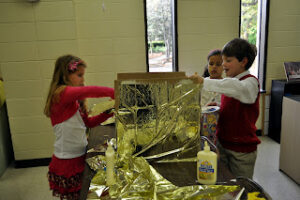 An ark of the covenant? How about decorating a box with gold wrapping paper for the ark?
An ark of the covenant? How about decorating a box with gold wrapping paper for the ark?
(Wouldn’t it be fun to light some incense and see what it smells like?)
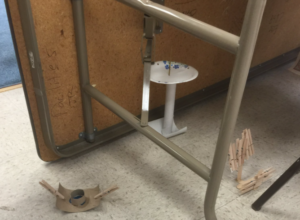
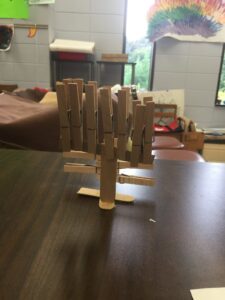
If we’re going to make all those pieces, why not make a tent of meeting in which to put them?
A table turned on its side could give us the framework.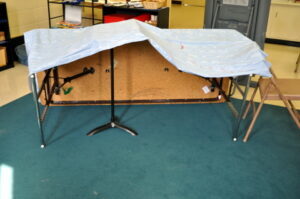
There are a few tablecloths folded up in the art supply room to serve as the tent fabric.
What if we brought blankets from home? We could even have a four layer tent, much like the tent is described in the Bible.
Once the tent is made, we could put all the pieces we created inside it. How would we separate the Holy of Holies?
Or we could make a small tabernacle out of cardboard and fabric.
There’s so much to think about. I can’t wait to see what your classes create! If you take photos, please share them with me. I’d love to add them to the parent newsletter!
Have fun, y’all! And for more ideas, including snack ideas for the lesson, see my Pinterest page on the story, here.
The post The Ark and the Tent appeared first on beckyramsey.info.
September 13, 2021
The Ten Best Ways
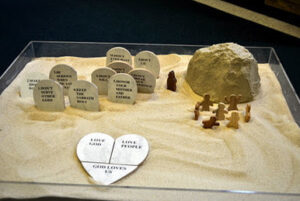 Welcome to The Ten Best Ways, our Godly Play story for this coming Sunday, October 6. You can find the story in Exodus 20:1-17, Deuteronomy 5:1-21. The Godly Play script can be found in the 14 Presentations for Fall book (the orange one), p. 73-80.
Welcome to The Ten Best Ways, our Godly Play story for this coming Sunday, October 6. You can find the story in Exodus 20:1-17, Deuteronomy 5:1-21. The Godly Play script can be found in the 14 Presentations for Fall book (the orange one), p. 73-80.
I love that Godly Play refers to the Ten Commandments as The Ten Best Ways and places them in a heart shaped box. This helps us remember that our God is not a supreme dictator who exists just for the chance to squash us when we don’t adhere to his rules, but is instead a God who loves us enough to want to give us boundaries, so that we can fully enjoy the life God meant for us.
In preparation for teaching the lesson, it’s good to look back at the session that precedes it: the Exodus. God has led his people out of slavery, away from Pharaoh and the soldiers chasing after them, through the sea, into freedom. Now they can live where they want, do what they want, be who they want. As the story script says, “Now that the people are free…where will they go now? What is the best way?”
Thank goodness (and thank God!) that God provided divine guidance, motivated completely by love.
What to focus on? Here are some general ideas :
1. The younger classes (first grade and younger) might choose to keep things simple by focusing on the first heart in the box: Love God, Love People, God Loves You. Or, depending on the children, you could go deeper and study all the commandments. You probably have an idea of what the children can handle best.
2. Study each of the commandments by reproducing them in some way.
3. Explore the idea of Moses being the only one with the courage to climb up into the fire and smoke to meet God. Children will find it interesting that God wanted to protect Moses from his powerful presence, so God put him in a crevice in the rock and put his hand over him until he had passed by, allowing Moses to see his back. I love the line, “When we see God’s back, we can follow God all of our days.”
4. The older children may benefit by exploring the conflict that comes when we find ourselves stuck between two commandments, like when Grandma gives you a present that you don’t like and asks you what you think of it. How do we love others and still stay true to the truth?
We should also address more close to the heart conflicts, like divorce. Many of our children are experiencing divorce and will be listening especially to the Best Way of honoring marriage. We need to be sure to include in our session a focus on grace and forgiveness. Sometimes people try their very best to honor the Ten Best ways, and it just doesn’t work out. God always offers love and forgiveness to all. His love never stops, no matter what.
Art Response Ideas: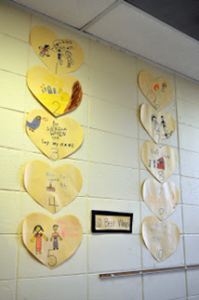 * Give the children big construction paper hearts divided into the sections Love God, Love People, and God Loves You. “I wonder how you could illustrate each section?” Children could choose whether to draw or cut pictures from a magazine or paint with watercolors. Or children could work together on one huge heart of butcher paper, contributing illustrations for each section. (This idea is especially for the younger children.)
* Give the children big construction paper hearts divided into the sections Love God, Love People, and God Loves You. “I wonder how you could illustrate each section?” Children could choose whether to draw or cut pictures from a magazine or paint with watercolors. Or children could work together on one huge heart of butcher paper, contributing illustrations for each section. (This idea is especially for the younger children.)
*Let each child make a set of commandments, painting the tablets with watercolors after they write their version of the Ten Best Ways. It’s beautiful…see here.
*See this version done on slate.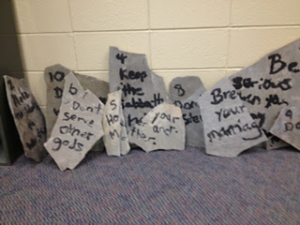
* I wonder if we could make a Mount Sinai? (With a cleft for Moses to hide in!) Could we make Moses out of a clothespin? How would we make the Ten Best Ways?” The youngest children might need ideas from which to choose.
*Could we make a huge set of Ten Best Ways together for our classroom? As tall as a child? Could we illustrate each commandment? Which one would you like to work on?
*I wonder what materials we might use to make individual sets of Best Way hearts, so that you can take it home with you. (You might want to see what kind of interesting materials you can find at a craft store. Save your receipts and I’ll reimburse you.)
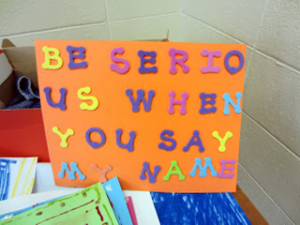 *I wonder if you can make up hand motions to illustrate each individual Best Way? Could you split them up among children and videotape each one, making a video the whole class can enjoy? (If somebody does this I’d love to share it with parents!)
*I wonder if you can make up hand motions to illustrate each individual Best Way? Could you split them up among children and videotape each one, making a video the whole class can enjoy? (If somebody does this I’d love to share it with parents!)
*I wonder which is your favorite commandment? Would you like to concentrate just on that one, making a 2 dimensional or 3 dimensional representation of it? (a drawing or collage or making a scene out of play clay, etc?)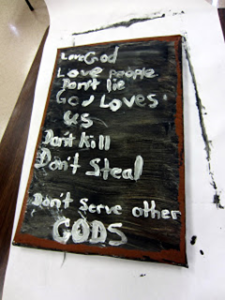
Obviously, we wouldn’t want to present ALL of these options to the class, as that might be too overwhelming. But it’s a list I hope will help you…and get you started thinking of your own ideas.
And if you’d like more ideas, check out my Pinterest page on the Ten Best Ways, here.
Enjoy!
The post The Ten Best Ways appeared first on beckyramsey.info.
September 7, 2021
The Exodus
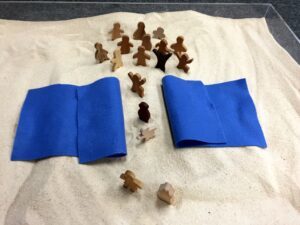 Welcome to The Exodus, found in Exodus 11:1-15:21. The Godly Play script is in the yellow (Fall) book, p. 65-72.
Welcome to The Exodus, found in Exodus 11:1-15:21. The Godly Play script is in the yellow (Fall) book, p. 65-72.
When we left Moses last week, he was getting ready to go with Aaron to speak to the Pharaoh and to do what God told him to do: set the people free. Would he have the courage? Would God help him? How would it all play out? This week we get to celebrate the answers to these questions.
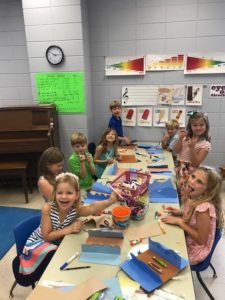
I would suggest telling the story as the script describes, and then, when Moses enters the scene, recap last week’s story before moving on, so that children can connect the two stories.
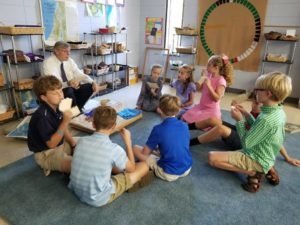 If you’re up for it, you might want to consider celebrating the story with an exploration of the seder meal, as described below. If you’re not up for that, I’ll have matzo for each classroom for the children to try.
If you’re up for it, you might want to consider celebrating the story with an exploration of the seder meal, as described below. If you’re not up for that, I’ll have matzo for each classroom for the children to try.
I’ve changed the wondering questions a little bit:
1. I wonder what part of the story you like the best.
2. I wonder what part is the most important.
3. I wonder if you were one of God’s people, how you might have felt when the Pharaoh set you free to follow Moses.
4. I wonder what you might have felt as you saw the sea part and a path emerge.
5. I wonder what part of this part of this story is about you, or what God is teaching you about Himself in this story.
Create a Gift for God Time
1. Children could recreate the story scene of the crossing of the Red Sea. Let children decide how they want to recreate this. They could make the pieces of the story- like the chain, the felt water that can be parted, the people, etc.
There’s an amazing example here. Take a look!
Here’s another example.
I’ll have blue paper and felt.
2. Children could work together to create a long chain, symbolizing the slavery the people of God had to be freed from. Here’s a pic of last years chain from 2nd grade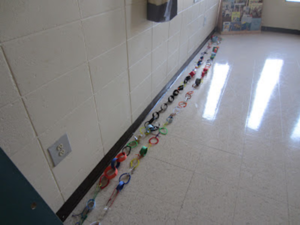 .
.
3.This would be a perfect time for the children to celebrate the seder meal. We did this in VBS a few summers ago and the children might remember enough to teach you about it! Just bring me a clean receipt and I’ll be glad to reimburse you. The meal is so full of meaning, all centered around this story.
Here’s a guide with a simple explanation.
This allows our children to experience the Passover in a small way.
4. Children could make an instrument like Miriam might have used to celebrate the exodus. Look here for an example of a paper plate shaker. Let the children decorate it as they wish. We have paper plates and may have jingle bells, as well, in the art resource room if you want to use them.
For more art ideas, check out my Pinterest page, here.
Thanks y’all, for helping our children not only hear the story of the Exodus, but participate in it as well!
Love, Becky
The post The Exodus appeared first on beckyramsey.info.
August 30, 2021
The Story of Moses: The Beginning
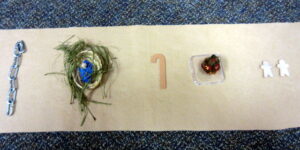 Welcome to The Story of Moses, found in Exodus 1:8-17:7, 19:1- 40:38. The script is adapted from the story found in the pink Enrichment Presentations for Fall book, p.58-65. Sunday school teachers, I will emailed you a copy of the adapted script. If you’d like a copy and you’re not at FBG, feel free to email me and I’ll try my best to send it out to you.
Welcome to The Story of Moses, found in Exodus 1:8-17:7, 19:1- 40:38. The script is adapted from the story found in the pink Enrichment Presentations for Fall book, p.58-65. Sunday school teachers, I will emailed you a copy of the adapted script. If you’d like a copy and you’re not at FBG, feel free to email me and I’ll try my best to send it out to you.
The timing of this story works well too with our story schedule, since we just shared the lesson of Joseph and will cover the Exodus story next. This adapted script ends right before Moses goes to talk with the Pharaoh, so the Exodus story can be shared as written in its Godly Play script. Be sure to end this story helping the children enjoy the suspense for next week’s lesson. It would be wonderful for them to go home asking what happens next, and reflecting on the story of the day.
Here are the wondering questions:
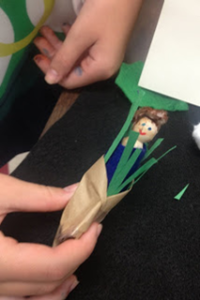 1. I wonder what was your favorite part of today’s story?2. I wonder what was the most important part?3. I wonder if Moses ever made bad choices. I wonder if God can use people who sometimes make mistakes.4. I wonder how Moses felt when God told him that God wanted Moses to set the people free from slavery.5. I wonder what Moses did to get ready to speak to the Pharaoh about setting the people free.
1. I wonder what was your favorite part of today’s story?2. I wonder what was the most important part?3. I wonder if Moses ever made bad choices. I wonder if God can use people who sometimes make mistakes.4. I wonder how Moses felt when God told him that God wanted Moses to set the people free from slavery.5. I wonder what Moses did to get ready to speak to the Pharaoh about setting the people free.What fun the children will have in our Make A Gift for God Time!
Here are some ideas to get the children started in planning their work:
1. Children can recreate the Moses in the Reeds scene, as shown Children can make their own basket and baby Moses using an a cup cut from an egg carton or paper bag- and whatever they like to make Moses (paper or a cotton ball for a head, felt for a blanket, etc). Blue construction paper could be the river and green for the reeds. They could even make the rest of the materials in the Godly Play story basket: a paper chain, a shepherd’s crook, the burning bush.
So that they get more invested in their work, allow them to make as many choices as to how they create the scene as possible.
I’ll have egg cartons, cotton balls, felt, and construction paper on hand on the cart at the end of the hall. Be sure to take photos of their work! [image error]
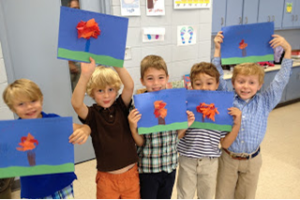 2. What would the burning bush look like? Children can use their imaginations to recreate it with tissue paper or other materials. Look here for another way to represent it. I’ll have tissue paper and stones on hand for you on the cart.
2. What would the burning bush look like? Children can use their imaginations to recreate it with tissue paper or other materials. Look here for another way to represent it. I’ll have tissue paper and stones on hand for you on the cart.
3. Younger kids (1st or 2nd grade?) would LOVE using a water table and setting up the scene with baby baskets and reeds as shown on this precious blog, here. Really! Check it out! You’ll want to join in the fun if you take a look! Let me know if you want to use a water table in your room and I’ll try to borrow one for you!
4. Older children might enjoy videoing a news reporter, interviewing bystanders who’ve observed different parts of Moses’ life first hand. Children could even set it in modern times, if they wanted to. (How would it be different if it happened today?) My camera will be in the drawer. Be sure to video!
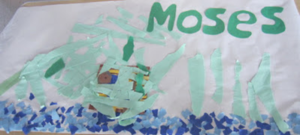 5. The class could make a group mural, collage style. Like this one:
5. The class could make a group mural, collage style. Like this one:
Enjoy!
The post The Story of Moses: The Beginning appeared first on beckyramsey.info.
August 23, 2021
The Story of Joseph
 Welcome to the Story of Joseph, found in Genesis 37:1-31 and 49:1-6. (The script is found in the pink Enrichment Presentations for Fall book, p.51-57.)
Welcome to the Story of Joseph, found in Genesis 37:1-31 and 49:1-6. (The script is found in the pink Enrichment Presentations for Fall book, p.51-57.)
Since we just presented the Story of Jacob last week, this is the perfect time to talk about Jacob’s son Joseph. This story will help the children answer the question of how the people of God moved to Egypt and became slaves–which will help the Moses story and the Exodus story make more sense.
I’m sure that the children will find many parts of the story interesting- like the idea of Joseph being the favorite son, the sibling rivalry between the brothers, the enslavement and imprisonment of Joseph, the idea that dreams mean something, and the repairing of the relationship between Joseph and his brothers.
Ideas for our Make A Gift for God Time: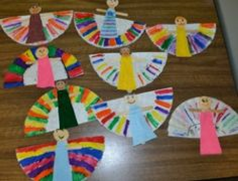 Children could recreate the story in some way. Please remember that the activity will mean more to the children the more choices they have in how they decide what “work” to do and how they will accomplish it.
Children could recreate the story in some way. Please remember that the activity will mean more to the children the more choices they have in how they decide what “work” to do and how they will accomplish it.
1. Children could make a coat of many colors.
There are lots of ways they could do this. Several are described here. If the children want to make a coat of construction paper and trimmings, I’ll have construction paper, rickrack, buttons, etc on our cart at the end of the hall.
2. You could let the children pick scenes from Joseph’s life to draw out and put them together to make a mural of the different scenes. You could include in these the dreams he interpreted. We have plenty of huge mural paper.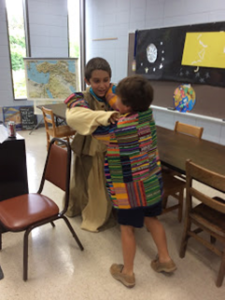
3. Kids could make Egyptian costume pieces and act out parts of the story. Costume pieces are shown here. We have all sorts of fabric, beads, card stock, etc for the costumes. I’ll pull some to have on the cart on the hall.
4. You could also help the children explore what God is teaching us through Joseph’s story–how he mends his relationship with his brothers, despite everything, how he remains faithful to God in the middle of his troubles, and how God uses Joseph throughout his life. Could the children sketch and then paint with water colors ( or use marker or crayon) the scene of Joseph reuniting with his brothers? Maybe this could be a class project. Watercolors will be on my cart.
5. Don’t forget that one choice for a child’s work can always be to retell the story (using the materials that the teacher used) to another child. They love to handle the materials themselves and can use the laminated card to check themselves, to make sure they include all the parts of the story.
For more ideas on directions children can take with art response, see my Pinterest page here.
Enjoy!
The post The Story of Joseph appeared first on beckyramsey.info.
August 12, 2021
The Story of Jacob
 Welcome toThe Story of Jacob, found in Genesis 25-33,35. (The script is found in the pink Enrichment Presentations for Fall book, p.44-50.)
Welcome toThe Story of Jacob, found in Genesis 25-33,35. (The script is found in the pink Enrichment Presentations for Fall book, p.44-50.)
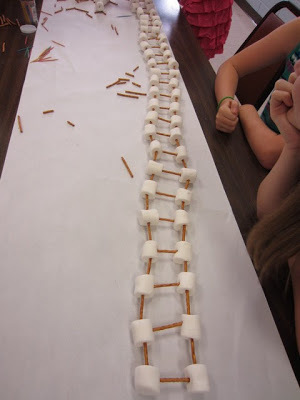 3. Make a Jacob’s ladder snack out of marshmallows, pretzels and marshmallow cream, as described hereYum!
3. Make a Jacob’s ladder snack out of marshmallows, pretzels and marshmallow cream, as described hereYum!4. Teach the children how do to Jacob’s ladder with a piece of string, as shown in this video.
While you’re practicing, talk about what the dream meant.See more ideas at my Pinterest page on the story of Jacob, here.Enjoy!
The post The Story of Jacob appeared first on beckyramsey.info.
August 9, 2021
The Great Family
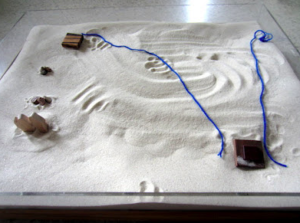 Welcome to the lesson of The Great Family, found in Genesis 12-15, 24. (Script is found in the yellow Fall book, p.57-64.)
Welcome to the lesson of The Great Family, found in Genesis 12-15, 24. (Script is found in the yellow Fall book, p.57-64.)
Idea Starters for the Give a Gift to God Time:
1. Stars! Check out these GORGEOUS stars shown here, which would be easy for all ages to make. Children could write on the other side a Bible verse from this story, perhaps Genesis 15:5 “ See the many stars. There are so many you cannot count them. Your family will be like that.”
Or make a moon and star like this: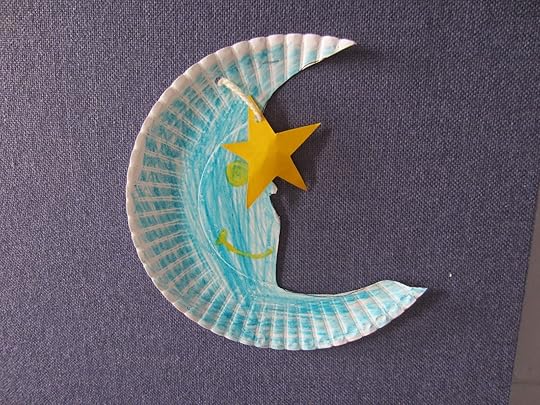
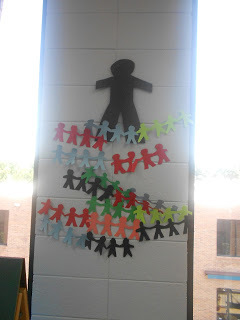
2. The beginnings of the great family: make Sarah and Abraham and Isaac out of play clay or clothespins. Or make finger puppets of the family. (Plenty -hundreds- of clothespins are in the art resource room in a cardboard box.
3. Each child individually- or all children together- could make a drawing of their part of the great family– their birth family and church family, all on one piece of butcher paper.
4.Sand drawings or sand art – to remember the desert in the story. Make a simple drawing- or the child’s name written in cursive- and cover the lines with glue, (I have new glue bottles in my office) then sift colored sand over the glue. The glue will stick to the sand. Children could also include names of others in their family.
5. Act out the story: Abram and Sarai walking toward Haran, sleeping in their tent, walking along the Euphrates, Abram being with God and knowing God wanted them to move on, Abram building an altar in Shechem and then in Bethel and Hebron, God’s promise to Abram, Sarah hearing she would have a son and laughing, Isaac and Rebekah.
6. Make a door hanger to commemorate Abram and Sarai’s willingness to go where God led them. You could use 1 John 5:3: This Is Love for God:to Obey His Commands.
7. Let children who wish to make a map of the area of the story.
For more art response ideas, see my Pinterest page, here.
Enjoy!
The post The Great Family appeared first on beckyramsey.info.
August 2, 2021
The Flood and the Ark
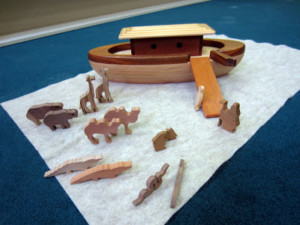 Welcome to The Flood and the Ark, found in Genesis 6:5 – 9:17 and found in The Complete Guide to Godly Play, Vol 2, 14 Presentations for Fall p. 49-56 (the orange book.)
Welcome to The Flood and the Ark, found in Genesis 6:5 – 9:17 and found in The Complete Guide to Godly Play, Vol 2, 14 Presentations for Fall p. 49-56 (the orange book.)
I’m especially interested in how the children will respond to the wondering question, “I wonder where you are in the story or what part of the story is about you.” If you’re at FBC Greenville, please do have someone write down their responses so we can share them. Thank you!
Idea Sparkers for the Give A Gift to God time:*A fun snack might be animal crackers. Just make sure they contain no peanut oil or tree nut oil, as we have children with severe allergies to nuts.
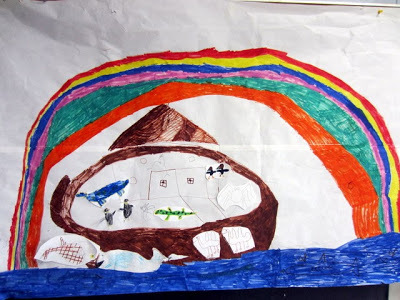
*You may have seen this mural that the children worked on together a couple of years ago for Noah’s ark. Some children made the ark itself, others a rainbow, others pairs of animals (on separate sheets that they cut out and glued to the ark) They LOVED doing this, and there was lots of ownership since each child got to pick what they made. Why not repeat it in your class?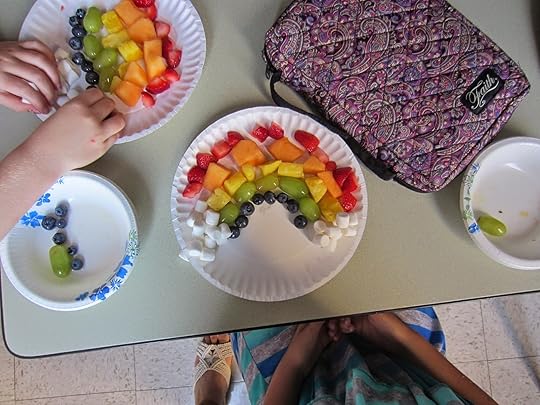 *Kids could make an ark on paper and find magazine photos of animals to glue on to make a collage.
*Kids could make an ark on paper and find magazine photos of animals to glue on to make a collage.
*Make an edible rainbow out of fruit!
*Make animals out of play dough for an ark the class makes.
*Play an animal matching game.
*Emphasize God’s promise by making rainbow castanets, as shown here. Or make any of the other rainbow projects as shown here.
Or a rainbow of promises through people’s hands, like this one our fifth graders did last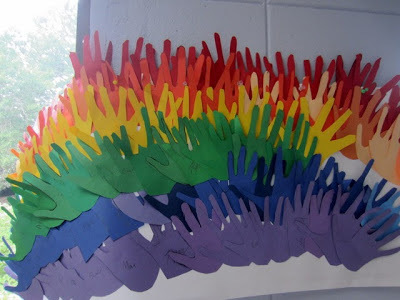 year…
year…
*Make an ark out of Popsicle sticks as shown here. Scroll 3/4 the way down.
For more ideas, see my Pinterest page here.
Enjoy!
Love, Becky
The post The Flood and the Ark appeared first on beckyramsey.info.
July 26, 2021
The Creation
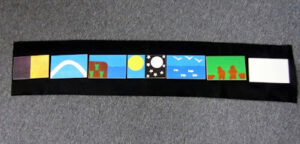 Welcome to the story of Creation, taken from Genesis 1:1-2:3, and also found in The Complete Guide to Godly Play, Vol 2, the orange book, 14 Presentations for Fall.What a wonderful story about gift giving and creating! As it says in the Godly Play book, you can tell much about the giver by looking at the gift, and what an incredible gift creation is.Be sure to ask the wondering questions. They’re simple but they invite deep thinking!1. I wonder which one of these days you like best.2. I wonder which day is most important.3. I wonder which day you are in or which one is especially about you.4. I wonder if we can leave out any one of these days and still have all the days we need.Classes at FBC Greenville might want to take a mini-field trip down the hall and
Welcome to the story of Creation, taken from Genesis 1:1-2:3, and also found in The Complete Guide to Godly Play, Vol 2, the orange book, 14 Presentations for Fall.What a wonderful story about gift giving and creating! As it says in the Godly Play book, you can tell much about the giver by looking at the gift, and what an incredible gift creation is.Be sure to ask the wondering questions. They’re simple but they invite deep thinking!1. I wonder which one of these days you like best.2. I wonder which day is most important.3. I wonder which day you are in or which one is especially about you.4. I wonder if we can leave out any one of these days and still have all the days we need.Classes at FBC Greenville might want to take a mini-field trip down the hall and
 take a look at our world created in tiles years ago during Sunday school.
take a look at our world created in tiles years ago during Sunday school.What can they find on the tiles that shows God’s creation?
For our Make a Gift for God time, here are some ideas to get the children started:1. Since today is Promotion Sunday at FBG, you may want to use the art response time to do an activity that gives the children a way to introduce themselves to you. You could invite each child to decorate a piece of paper with her/his name (we have plenty of letter stickers in the resource room if you’d like to use them) and drawings of what she/he like to do, their family with pets, her/his favorite foods, etc. 2. Choose a day (or assign a day) and invite the children to create and illustrate their own plaque or water color drawing- or clay sculpture or pencil drawing depicting that particular day. This could be done as a class mural or completed individually.Here’s an example in which children did water colors and then put them together.3.Each child could make her/his own set of days, as is shown here. Check out dozens of more ideas at the Pinterest site here.Thank you for all you do for our children!Becky
2. Choose a day (or assign a day) and invite the children to create and illustrate their own plaque or water color drawing- or clay sculpture or pencil drawing depicting that particular day. This could be done as a class mural or completed individually.Here’s an example in which children did water colors and then put them together.3.Each child could make her/his own set of days, as is shown here. Check out dozens of more ideas at the Pinterest site here.Thank you for all you do for our children!BeckyThe post The Creation appeared first on beckyramsey.info.
July 19, 2021
The Circle of the Church Year
Hi Godly Play Teachers! Welcome to the Circle of the Church Year!
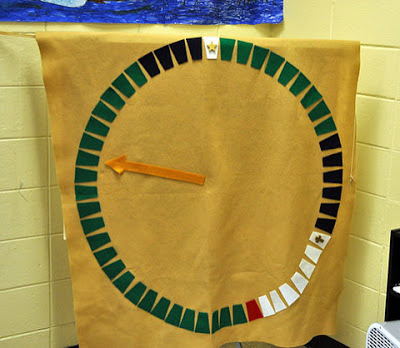
This is one of my favorite lessons of the year. The calendar makes so much sense that I think we should teach it to adults as well!
The lesson comes with wondering questions. I’ll include them in your class folder as well.
Hints for the Create-a-gift-for-God time:For younger children:
1. Younger children are already learning about calendars and enjoy displaying what they know. Why not go ahead and print on a paper for each child, “Thank You God, for Our Church Year!” Then they could write out the month names and draw things beside each month that they are thankful for…Like a birthday cake on their birthday month. Snow by January. A Valentines heart by February. Kites by March (or basketball, for March Madness!) This is a perfect time to reinforce the special times that the church celebrates on their own calendars- and what time of the year in which they occur.
2. If a younger child wants to make his own calendar, why not? It doesn’t have to be a calendar like we could make. Younger children often like writing their numbers. It would be fun to have different calendars on hand to talk about different ways we keep record of time. I can see lots of inroads for discussion on the church’s calendar with this.
3. Here’s another idea that would be great for younger children- and let’s them practice their knowledge of what color goes with what season, etc. Take a look at it!
4. Why not play with the colors of the church calendar (purple, green, red, white). Here’s a pinterest site with lots of ideas especially great for younger children, but enjoyable for older as well! (It will make you happy just to look, I promise!) The bead necklace version of the calendar is great!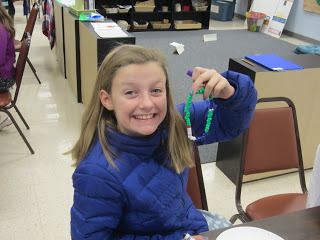
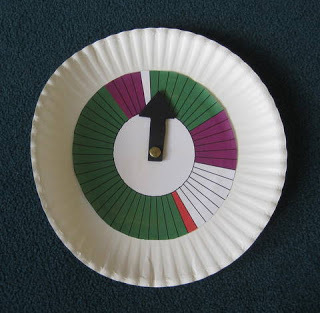
For older children:
The children could make their own rendition of the Godly Play Calendar with a paper plate, a color copy (that I’ll have on hand), a brad, and a fun foam arrow. Susan D. came up with this, and it works great!
Enjoy!
The post The Circle of the Church Year appeared first on beckyramsey.info.

